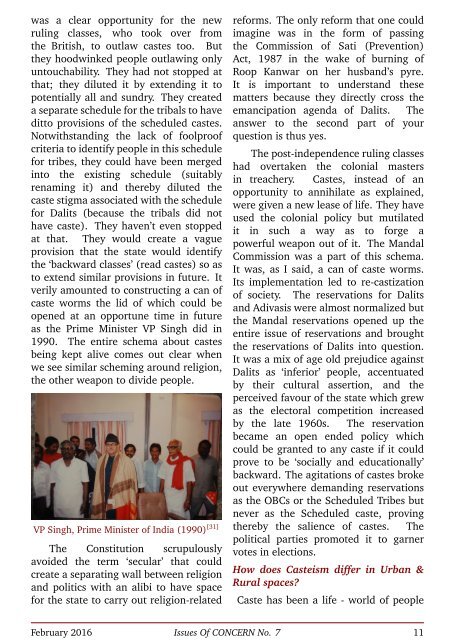ISSUES OF CONCERN
Issues_of_Concern_February_2016
Issues_of_Concern_February_2016
You also want an ePaper? Increase the reach of your titles
YUMPU automatically turns print PDFs into web optimized ePapers that Google loves.
was a clear opportunity for the new<br />
ruling classes, who took over from<br />
the British, to outlaw castes too. But<br />
they hoodwinked people outlawing only<br />
untouchability. They had not stopped at<br />
that; they diluted it by extending it to<br />
potentially all and sundry. They created<br />
a separate schedule for the tribals to have<br />
ditto provisions of the scheduled castes.<br />
Notwithstanding the lack of foolproof<br />
criteria to identify people in this schedule<br />
for tribes, they could have been merged<br />
into the existing schedule (suitably<br />
renaming it) and thereby diluted the<br />
caste stigma associated with the schedule<br />
for Dalits (because the tribals did not<br />
have caste). They haven’t even stopped<br />
at that. They would create a vague<br />
provision that the state would identify<br />
the ‘backward classes’ (read castes) so as<br />
to extend similar provisions in future. It<br />
verily amounted to constructing a can of<br />
caste worms the lid of which could be<br />
opened at an opportune time in future<br />
as the Prime Minister VP Singh did in<br />
1990. The entire schema about castes<br />
being kept alive comes out clear when<br />
we see similar scheming around religion,<br />
the other weapon to divide people.<br />
VP Singh, Prime Minister of India (1990) [31]<br />
The Constitution scrupulously<br />
avoided the term ‘secular’ that could<br />
create a separating wall between religion<br />
and politics with an alibi to have space<br />
for the state to carry out religion-related<br />
reforms. The only reform that one could<br />
imagine was in the form of passing<br />
the Commission of Sati (Prevention)<br />
Act, 1987 in the wake of burning of<br />
Roop Kanwar on her husband’s pyre.<br />
It is important to understand these<br />
matters because they directly cross the<br />
emancipation agenda of Dalits. The<br />
answer to the second part of your<br />
question is thus yes.<br />
The post-independence ruling classes<br />
had overtaken the colonial masters<br />
in treachery. Castes, instead of an<br />
opportunity to annihilate as explained,<br />
were given a new lease of life. They have<br />
used the colonial policy but mutilated<br />
it in such a way as to forge a<br />
powerful weapon out of it. The Mandal<br />
Commission was a part of this schema.<br />
It was, as I said, a can of caste worms.<br />
Its implementation led to re-castization<br />
of society. The reservations for Dalits<br />
and Adivasis were almost normalized but<br />
the Mandal reservations opened up the<br />
entire issue of reservations and brought<br />
the reservations of Dalits into question.<br />
It was a mix of age old prejudice against<br />
Dalits as ‘inferior’ people, accentuated<br />
by their cultural assertion, and the<br />
perceived favour of the state which grew<br />
as the electoral competition increased<br />
by the late 1960s. The reservation<br />
became an open ended policy which<br />
could be granted to any caste if it could<br />
prove to be ‘socially and educationally’<br />
backward. The agitations of castes broke<br />
out everywhere demanding reservations<br />
as the OBCs or the Scheduled Tribes but<br />
never as the Scheduled caste, proving<br />
thereby the salience of castes. The<br />
political parties promoted it to garner<br />
votes in elections.<br />
How does Casteism differ in Urban &<br />
Rural spaces?<br />
Caste has been a life - world of people<br />
February 2016 Issues Of <strong>CONCERN</strong> No. 7 11


